It’s something out of a twisted wingnut fantasy: 25,000 identically-dressed, tough-looking men and a charismatic leader with a simple, strong motto (in this case, “Believe! Obey! Fight!”) barge into the capital city and bully their way into a leadership role in the government. No complicated voting, no messy democracy, no stupid consensus; just a bunch of ballsy, take-charge kinda guys who know what’s best for the nation and its historically-destined people – and woe unto he who disagrees with their image of what “the nation” ought to be…
And yet, like so many bizarre, terrifying, and ultimately uncivilized events, this one actually happened. Join me, if you will, in the Cave of the Moonbat, where tonight we’ll take a peek at Italy in 1922 – and if we’re lucky, we’ll even be able to discern how the shadowy rightists behind Santelli and the Teabaggers have moved beyond simply genuflecting before Zombie Reagan, and may now actually be trying to resurrect Benito Mussolini himself.
 The Republican dictionary is an awfully short example of the genre, owing largely to the fact that many of the words are simply interchangeable. For example, we’ve all heard some Old Media pundit or another claim in recent weeks that Barack Obama is a “Marxist,” which on the face of it simply causes one to question whether or not Republicans know anything at all about Marx. Looking deeper, however, we can see that “Marxist,” to a Republican, is nothing more than another word for “bad” or “evil” or “un-American,” since all these words, too, have identical meanings. This is why “socialism” is the same as “communism,” why “Muslim” is the same as “terrorist,” and why “liberalism” is construed as “fascism.”
The Republican dictionary is an awfully short example of the genre, owing largely to the fact that many of the words are simply interchangeable. For example, we’ve all heard some Old Media pundit or another claim in recent weeks that Barack Obama is a “Marxist,” which on the face of it simply causes one to question whether or not Republicans know anything at all about Marx. Looking deeper, however, we can see that “Marxist,” to a Republican, is nothing more than another word for “bad” or “evil” or “un-American,” since all these words, too, have identical meanings. This is why “socialism” is the same as “communism,” why “Muslim” is the same as “terrorist,” and why “liberalism” is construed as “fascism.”
Conservatives need to keep their definitions as simple as possible, owing to the incredibly large number of things of which they are afraid. It’s simply too difficult for them to understand the differences between communism and socialism, let alone the variations of Marxism, Leninism, and Stalinism, so why bother? Forget about trying to explain how broadly-applied socialism has not wrecked Europe (or at least it didn’t until we sicced our economy on them), or how fascism, when it is placed on the standard political spectrum at all, is located on the right – to a Republican, anything that doesn’t affirm their preconceived notions of how the world operates falls under the blanket of “totalitarianism” or any of its synonyms. Since their reaction is inevitably the same no matter what cause of the fear, the situation can be seen as analogous to a suburban lawn commando with and inferiority complex and a fear of snakes: it’s easier for such a man to just run his lawnmower over every serpent he sees in his yard than it is to take the time and expend the effort learning which types are dangerous and which are beneficial.
(Please Note: the above paragraphs were both a preface to a discussion of fascism and a secret Republican filter – any stray wingnuts that found their way into this essay are still lingering over that last sentence, wondering what’s wrong with using lawnmowers to run over snakes. We progressives may now proceed in peace)
Making the World Safe for Fascism
The First World War didn’t work out quite the way Italy had wanted. Some of this – perhaps a lot of it – was the fault of Italy herself; she had, after all, stood through most of the tense summer of 1914 with her Triple Alliance partners Germany and Austria-Hungary, but when push came to shove, Italy chose to define Germany as the aggressor nation and so exercised her treaty rights not to attack France on Germany’s behalf. Still, Italy didn’t join the allies until after the conclusion of a secret treaty which promised post-war Italian control of significant chunks of Austro-Hungarian territory, in early 1915.
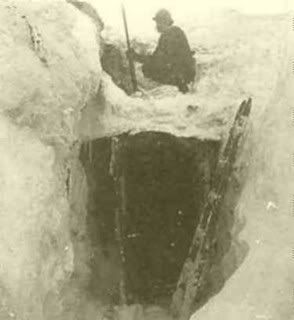 Italy spent most of the war engaged in a death-struggle with the Austro-Hungarians (augmented by significant numbers of Germans) over the short and pretty much vertical border between the two nations. The Italian Front represented some of the toughest and most brutal fighting in a tough, brutal war – all the fun and games of the trenches in France, only conducted at an elevation of 10,000 feet. It was unlike any fighting either side had ever experienced, and in the end, it would be the relative mastery of the emerging technologies and ideologies of the 20th century that would determine the victor.
Italy spent most of the war engaged in a death-struggle with the Austro-Hungarians (augmented by significant numbers of Germans) over the short and pretty much vertical border between the two nations. The Italian Front represented some of the toughest and most brutal fighting in a tough, brutal war – all the fun and games of the trenches in France, only conducted at an elevation of 10,000 feet. It was unlike any fighting either side had ever experienced, and in the end, it would be the relative mastery of the emerging technologies and ideologies of the 20th century that would determine the victor.
That would not be Austria-Hungary. When the war began, Hapsburg Emperor Franz Josef, who had created the Dual Monarchy (a power-sharing agreement) with the empire’s large Hungarian minority in 1867, was still on the throne. He’d been there since 1848, and had contended with everything from diplomatic blowback resulting from withholding support to Russia during the Crimean War, to his brother being shot in Mexico after ruling there for three years as an emperor, to the imperial designs of Otto von Bismarck, to having his son commit suicide and his wife assassinated by an anarchist. Franz Joseph was a 19th-century kind of guy, and though he remained popular with his people until his death in 1916, his armies – already a hodgepodge of different languages and ethnicities – were far more ready to re-fight the last war than they were to wage the current one. After a series of crushing defeats during Russia’s Brusilov Offensive in 1916, Austria-Hungary survived only through heavy reliance on German aid (at great cost to their own ambitions at Verdun and elsewhere) – for all intents and purposes, Austria-Hungary was finished as both an empire and a military threat by the time the US entered the war in April, 1917. That didn’t mean she didn’t still have some fight in her, though: a German-led offensive centered around the town of Caporetto in October, 1917, resulted in a humiliating defeat for the Italians, the fall of Italy’s Prime Minister, and the establishment in Versailles of a Supreme War Council designed to promote enhanced cooperation among the Allies.
To keep up the fighting spirit as the war dragged into 1916, then 1917, then 1918, both sides pioneered their own versions of the work the US would turn over to George Creel. Overt nationalism, many times spilling over the levee of rational thought and into the swamp of jingoism, was the propagandist’s order of the day. Sometimes they played up the religious end of things…
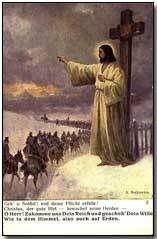
(this is actually a German postcard, but you get the idea – u.m.)
…and at others, a fear of a faceless, grasping, destructive enemy, or a reverence for an idealized national identity:
Ernest Hemingway served as an ambulance driver on the Italian Front, and recognized the danger that fanning the flames of rage-inspired nationalism portended in A Farewell to Arms, his 1929 fictionalization of the campaign:
“[Many of the soldiers] were beaten to start with. They were beaten when they took them from their farms and put them in the army. That is why the peasant has wisdom, because he is defeated from the start. Put him in power and see how wise he is.”
And sure enough, just as Creel was unable to control the fear his own agency had stoked and the US turned its anti-German mania into a full-fledged Red Scare, the genie was out of the Italian bottle, as well. As a member of the Big Four (along with France, Great Britain, and the United States) at the Paris Peace Conference, Italy had hoped to make stick the territorial concessions promised by France and Great Britain back in the heady days of 1915, but these ran afoul of President Wilson’s Fourteen Points and their avowed backing of national self-determination for the peoples of Eastern Europe and the Balkans. The Italians were especially pissed that their new Prime Minister, Vittorio Orlando, was unable to secure control of the port city of Fiume (now Rijeka, Croatia), at the northern end of the Adriatic.
Orlando might have dramatically exited the Conference in April, 1919, but he returned a month later to sign the Treaty of Versailles. This weakened his political position at home, and left him vulnerable to criticism from both the left and the right. The state of the Italian economy wasn’t really helping matters, either – even though many of its problems could be traced to pre-war conditions (as late as 1920, 40% of Italy GNP was derived from small family agriculture), it was easier to scapegoat Orlando for failing to uphold Italy’s dignity at the bargaining table than it was to confront the very real infrastructure problems that plagued the still-young republic.
Enter Mussolini
Benito Mussolini may have been destined from birth to be a revolutionary; his father, a blacksmith and a card-carrying Socialist, named him after the mid-19th century Mexican hero of the people, Benito Juarez. Despite Juarez’ accomplishments, however, things named for him don’t always turn out so well: Mexico just dispatched thousands of soldiers to his namesake city to do their part in the War on (Some) Drugs, and Mussolini became…well, Mussolini.
By 1911, Mussolini was enough of an anti-government hippie to cross his nation’s northern border to avoid serving in a war with which he didn’t agree – in this case, Italy’s invasion of Libya. By 1912, the war was over, Tripoli was annexed, the Ottoman Empire was just a tad bit smaller, and Mussolini was back in Italy. He became editor of Avanti, the newspaper of the Italian Socialists, and remained in that position until being ejected from the party (Mussolini had broken with the majority of Socialists who were opposed to the war) in the months between the outbreak of the Great War and his own country’s entry into it.
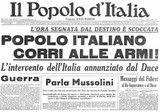 It was also during this period that Mussolini began espousing hyper-nationalistic points of view in his new paper, Popolo d’Italia (“People of Italy”). These were the building blocks of what would later grow into the cornerstones of fascist ideology, and they were based on the violence-prone ideas of antiliberal groups who mocked the left’s pacifism. Mussolini was drafted in 1915, but unlike so many of today’s right-wing chickenhawks, he donned his nation’s uniform, served at the front, and was dutifully wounded by a mortar blast in his trench.
It was also during this period that Mussolini began espousing hyper-nationalistic points of view in his new paper, Popolo d’Italia (“People of Italy”). These were the building blocks of what would later grow into the cornerstones of fascist ideology, and they were based on the violence-prone ideas of antiliberal groups who mocked the left’s pacifism. Mussolini was drafted in 1915, but unlike so many of today’s right-wing chickenhawks, he donned his nation’s uniform, served at the front, and was dutifully wounded by a mortar blast in his trench.
When he returned to full-time editorship of Popolo, Mussolini’s scars started to show – or rather, he started showing people his scars. He used his publishing pulpit – essentially the blogs of the era – to explore in detail his passion for socialist order, nationalist pride, and penchant for the violent realization of both. Italy as a nation was shell-shocked, bankrupt, and (as far as they were concerned) screwed over, so it’s little wonder that a blowhard who appealed to the people’s baser nature would gain traction in the court of public opinion.
The Moral of the Section: The Media is a Viable Launching Pad for a Fascist Rise to Power. Totalitarian leaders have risen from the hardscrabble working class (Stalin) and the military caste (Franco), but also from the ranks of middle-class intellectuals (Lenin) and many walks of life in between (Hitler, Mussolini). What they have in common is an effective means of delivering their message – Stalin through control of the Communist Party’s administrative apparatus, Franco through his command of the legendary Spanish Foreign Legion, and so on – which means that a self-aggrandizing megalomaniac who happens to have a media voice is in the perfect position to make a grab for the authoritarian ring.
Turning on the Charm
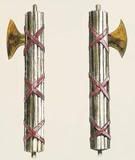 There were a lot of things for an Italian to be disgruntled about after the war, and Mussolini played on all of them. By March 23, 1919, he had gathered enough disaffected nationalists, commie-haters, and generally unhappy ex-soldiers to form the Fascio di combattmento (Union of Combat, or Union of Forces) in Milan, which set about organizing for the November, 1919 elections with the passion of the naively righteous. Mussolini had trouble attracting people to his new, Roman-legion-inspired banner, and the Fascist platform that year wasn’t all that different from that of the Socialists – territorial expansion, benefits for workers, and land reform for the peasants – and the Socialists were much better organized, leading to a poor showing at the polls for Mussolini and his fringe element.
There were a lot of things for an Italian to be disgruntled about after the war, and Mussolini played on all of them. By March 23, 1919, he had gathered enough disaffected nationalists, commie-haters, and generally unhappy ex-soldiers to form the Fascio di combattmento (Union of Combat, or Union of Forces) in Milan, which set about organizing for the November, 1919 elections with the passion of the naively righteous. Mussolini had trouble attracting people to his new, Roman-legion-inspired banner, and the Fascist platform that year wasn’t all that different from that of the Socialists – territorial expansion, benefits for workers, and land reform for the peasants – and the Socialists were much better organized, leading to a poor showing at the polls for Mussolini and his fringe element.
Mussolini learned some things in 1919, however, and these were to have a profound effect on the Fascist movement. The first was the inspiring example set by fellow nationalist and proto-Fascist Gabriele d’Annunzio, who in September launched a 2000-man raid on Fiume. He captured the city and attempted to hand it over to the Italian government. When this gesture was spurned, and the Italians instead blockaded the harbor, d’Annunzio declared independence and attempted to set up a parallel League of Nations to give voice to people caught in situations like the one in Fiume. He was finally driven from the city by Italian bombardment in December, 1920, and probably would have gone on to a role in the Mussolini government, had not he been pushed out of a window by a mysterious assailant just before the 1922 March on Rome.
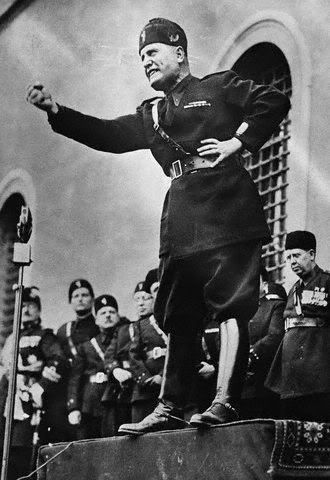 The other thing Mussolini learned was that while his policy suggestions may not have had much appeal, his blustery attacks on his Socialist opponents did. Sensing that the middle class was growing fearful of a politically empowered working class, Mussolini stepped up his attacks on the left, and began urging his growing army of blackshirted supporters to use violence in the course of political debate. These incidents weren’t large or bloody enough to draw a great deal of attention, at least at first – in a typical instance, a gang of guys might load up in trucks in the middle of the night and descend upon the home of a Socialist organizer, whom they would then beat up and force-feed a near-lethal quantity of castor oil. Alternately, the toughs would torch the offices of a leftist newspaper, or perhaps a Socialist meeting hall, in pursuit of an overall agenda of intimidation, rather than the outright killing, of their enemies.
The other thing Mussolini learned was that while his policy suggestions may not have had much appeal, his blustery attacks on his Socialist opponents did. Sensing that the middle class was growing fearful of a politically empowered working class, Mussolini stepped up his attacks on the left, and began urging his growing army of blackshirted supporters to use violence in the course of political debate. These incidents weren’t large or bloody enough to draw a great deal of attention, at least at first – in a typical instance, a gang of guys might load up in trucks in the middle of the night and descend upon the home of a Socialist organizer, whom they would then beat up and force-feed a near-lethal quantity of castor oil. Alternately, the toughs would torch the offices of a leftist newspaper, or perhaps a Socialist meeting hall, in pursuit of an overall agenda of intimidation, rather than the outright killing, of their enemies.
Wealthy Italian capitalists and industrialists didn’t have many allies in the summer of 1920, and the political process, once their own private plaything, had spiraled out of their control through the adoption of universal suffrage and the Catholic Church’s relaxation of its ban on participation in the political process. Since Mussolini at least opposed the Socialists, the moneyed class turned to the Fascists for support, and, through financial support of the party, essentially hired the Squadristi as strike-breakers and goons.
The Socialists were feeling empowered enough to make a bold show of strength in August and September, 1920, organizing a series of strikes and demonstrations that quickly became violent. The prime minister, Giovanni Giolitti, was more concerned with resolving Italy’s international conflicts and reducing the deficit than he was with settling the country’s social discord, and so allowed the strikes to run their course. This, too, played into Mussolini’s hand, since his Fascists became perversely associated with the maintenance of law and order in the eyes of the trembling, threatened upper classes.
Rather than appearing to capitulate to the moneyed interests, however, Mussolini played up the fact that he was nobody’s puppet, which caused his followers to revere him that much more. For their part, the Fascist rank-and-file became convinced that in addition to defending their nation against “the reds,” they were on the cutting edge of a societal revolution of their own. They felt they were not only putting nails in the coffin of parliamentary government (which wasn’t really working for them, anyway), but were, in fact, at the forefront of a dynamic new movement that would actually help the little guy in the eternal battle against the established interests that were keeping them down.
The Moral of the Section: In Any Move Toward a Totalitarian State, the Middle Class Must Be Either Dealt In or Dealt With Even though any group of five or more leftists would be hard-pressed to successfully organize a trip to the bathroom, to say nothing of overthrowing a country, the right fears our numbers and knows that any reckoning in a class war is going to go very poorly for them. Accordingly, they can be co-opted into doing what they feel they need to do in order to secure their privilege and wealth. If that means supporting fascist goons, they’ll do it – and if the goons wind up feeling legitimized by the whole sordid affair, well, that’s less of a pressing concern than land or wealth redistribution, anyway. Another option is the Stalinist approach of simply eliminating the entire class, or the Hitlerian one of placing it under rigid control, but when the right makes its move in this country, my money’s on them taking after Mussolini’s approach.
Appeasing the Bully
The legislative elections of May, 1921, went much better for the surging Fascists, who took 35 seats in parliament. It wasn’t a huge number, but it was enough to wreck Giolitti’s cabinet coalition, and Mussolini exacerbated the existing disorder by stepping up Fascist attacks, especially in his northern strongholds of Bologna and Milan. By early 1922, Mussolini was presenting himself as the only possible restorer of order and protector of private property in Italy, and more and more of those who were losing faith in the government (another Cabinet resigned in early February, 1922) were starting to believe him; even the army was benevolently neutral. Fascists seized control of Bologna in May and Milan in August, prompting Socialist leaders to try to stem the tide with a nationwide strike. Perhaps they didn’t realize just how far the violence-pendulum had swung away from them – Fascist toughs took to the streets in large numbers, and the strike was broken within 24 hours.
Mussolini, ever given to the swagger, now felt powerful enough to demand a seat at the table. Against a backdrop of organized violence across the nation, he threatened to march on Rome itself if he wasn’t given power. On October 27, 1922, Fascists started seizing control of cities and towns throughout Italy, while 25,000 more began to move toward the capital. Mussolini himself accompanied some of the marchers, but it was more photo-op than leading from the front – he never did take the lead in any of the columns of his supporters that were snaking toward Rome. The government tried to institute martial law, but King Victor Emmanuel III, dubious of his army’s loyalty and chances against the street-fighting Fascists, refused to sign the order. Instead, he asked Mussolini to form a government as Italy’s new Premier.
Much like D’Annunzio’s coalition-building in the wake of his seizure of Fiume, Mussolini formed a cabinet that had seats for members of every major party in Italy save for the Communists and Socialists. He assured the Chamber of Deputies that he would respect personal liberties (though with the caveat that he’d do so with “dignity and firmness…”), and they in turn approved his government by a vote of 306 to 116. Nine days later, harking back to similar periods of turmoil in the Roman Republic, that same body made Mussolini quasi-dictator for a period of one year.
He still couldn’t be described as “firmly in control,” but Mussolini’s supporters did what they could to tighten their grip on power. One of the first things that would have to go was the pesky problem of a democratically-elected legislative body, and the solution they came up with was positively Rovian in both nature and intent: on July 21, 1923, one of Mussolini’s supporters in the Chamber introduced a bill (later approved by both the Chamber and the Senate) that gave two-thirds of the seats in parliament to the party which received the largest number of votes in a national election, provided that that party got at least 25% of the vote in the first place. It was a means of making a minority party an instant super-majority, and Mussolini, by removing non-Fascists from the Cabinet, Civil Service jobs, and other parts of government, worked to ensure that his would be the party to benefit.
The plan worked, even if the elections of April, 1924, were marred by all sorts of violence. The Fascists “won” 60% of the popular vote, which gave them their 2/3 majority in the Chamber, and when Socialist leader Giacomo Matteotti attacked them for their blatant abuse of the electoral system, he was kidnapped and murdered. The opposition demanded that Mussolini be stripped of his power and his thugs disarmed after this outrage, but the King demurred. After a initial deer-in-the-headlights reaction – it’s unclear who ordered the assassination of Matteotti – Mussolini announced new policies that would “make the nation Fascist.” Government was henceforth by decree, freedom of the press was abolished, labor unions were disbanded, opposition party members were arrested, and Fascists were placed in charge of Italy’s schools and other youth organizations. By the end of 1926, Italy was a single-party state, though this didn’t become true in law as well as fact until 1928.
On Christmas Eve, 1925, Mussolini’s title was changed from “president of the Council of Ministers” to “head of the government,” making him answerable only to the King. Though a couple of safeguards still existed as ostensible checks on Mussolini’s power, their threat to his power was minimal – he could be removed by act of something called the Grand Council, for example, but only he could summon the Council and determine its agenda. In 1929, he reached an accommodation with the Catholic Church, the last major force in Italy which could have organized a resistance, by means of the Lateran Pacts, which recognized the Vatican as an independent state and provided the Church money in exchange for support of Mussolini’s government.
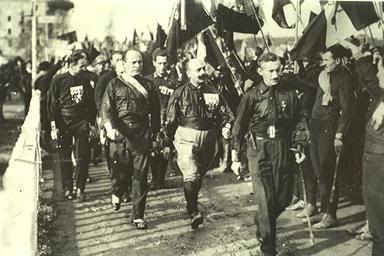 The Moral of the Section: Fascists Are Like Cops and Vampires – If You Invite Them Into Your House, You’ll Wind Up Powerless Against Them
The Moral of the Section: Fascists Are Like Cops and Vampires – If You Invite Them Into Your House, You’ll Wind Up Powerless Against Them
Totalitarians will use the democratic system to come to power, but of course have no tolerance for it once they’ve gotten what they wanted. We should be aware of this as the Republicans grow more and more shrill in their demands to be heard in the name of bipartisanship.
Fascism for Fun and Profit
There’s been a lot of talk from our friends on the right about just how fed up they are with the 50 days or so of the Obama presidency, and some of them have flat-out stated that they aim to misbehave. These are not things that should be ignored, for as history shows us, one opportunistic sociopath with delusions of grandeur can indeed rise to the top of the political structure, given the right circumstances. I propose that if those conditions do not presently exist in the United States, they can or may soon – and we need to be ready to defend our government and its institutions from those who burn it down in order to “save” it. I’m not suggesting a system of gulags and re-education camps; what I am saying is that there may come a time when a modern blackshirt…
…will make his play, and we damn well better be more ready for it than was the population of Italy in the early 1920s. It takes surprisingly little to push a nation’s population into the embrace of totalitarian leadership, whether from the left or the right. Complacency and a paralyzing, avoidance-inducing fear of worsening conditions have always provided the medium with which the protagonists of a nascent fascist movement manipulate the nation’s contemporary mood and past history, and the United States is no exception. For the past several weeks, signs have been indicating that a new movement is afoot in the land – or rather, an old movement, now under new management, is now being revived, and it’s up to us to ensure that old playbook is no longer an effective path to power.

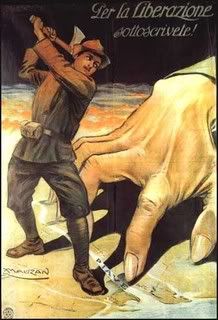
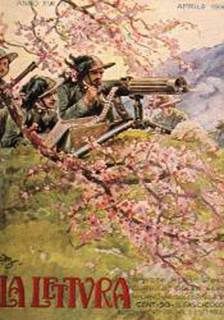
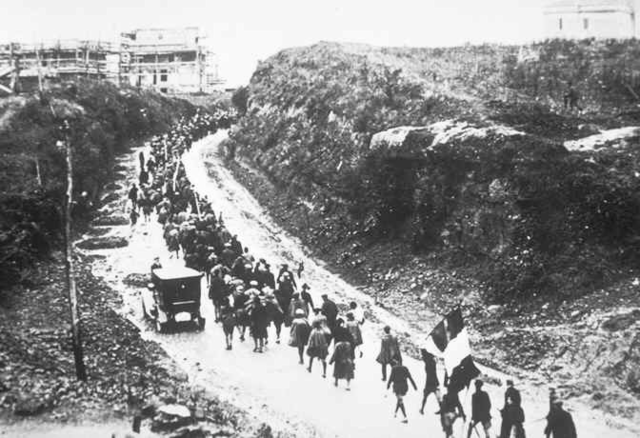
5 comments
Skip to comment form
Author
an intentional homage, or a result of something he once read about the slimming effects of black clothing?
he looked like night with a head. Probably though it made him slimmer, plus he really seems to like being a symbol of the dark. Hate is a dark thing. I think the fascists here had their chance and blew it as they got so greedy, so incompetent and so arrogant. Will they keep trying, you betcha. Right now, they are making the case for democracy, by showing how unhinged they are. The core of hate and fear is all that’s left of their ‘New World Order’. Now they are just the snarling dogs who went to far and lost their grip on our society. Thanks for this history about the Italian fascists who I did not know that much about.
in a cafeteria, in Munich Germany. The table conversations included vacations in parts of the world I knew were US verboten locations. The featured dish of the day was “Sud-Americanisher” and that Oh My God Argentina/ ex-Nazi conspiracy theory button get pushed. I was in the company of good people, good engineers and I was a guest in their country. Noting that glorious vaccum of sanitized international CNN vs the shit we get at home I shut my mouth.
Your essay is very in depth, but leaves out the economic aspect of why fascism was able to take hold in Germany and Italy. The collapse of their relative monarchies, and the fractured economy and disunity following the Depression left the average person longing for any form of stability and order out of chaos that would be extended to them.
I learned how disorganized most of continental Europe was following the Depression in high school, but it really came home to me while stationed in Germany and able to purchase shoeboxes full of “Inflationgelt” at the local flea markets. Every little city and town and principality had it’s own money and rates of exchange were in constant flux. Heck, there’s still a dialect problem in both countries. Germany, Italy, and some other parts of the continent were naturally reverting to feudal patterns of small government in order to survive.
There was a vaccuum when it came to common goals, common purposes and common methods of operation in both countries. The robber barons/”moronarchies” of the previous decades had looted the country’s treasuries and fled to more insulated domains during World War I, leaving the rest of the people to fend for themselves and try to put the pieces of their society back together. Fascism, then as now, preyed on the fears of the people that other more unified countries would be able to push them around unless they too united and became hyper-military.
There was a vaccuum of unified, orderly governmental function in both of these countries as a result of what should be extremely familiar looking causes.
As much as nature abhors a vaccuum, shit most surely loves one. Fascism is… the shit.
Yes. I got 100 on that history test.
More than once.
Frankly, I’m tired of taking it.
…I’ll read this. It’s too late for me now to give it the attention it deserves.
For now, I’ll just comment that your link to “santelli and the teabaggers” goes to a playboy bunnies site, saying the clicked page is not available. Seems like the teabagging brown &/or black shirts are johnny-on-the-spots. But I do believe their sortie into the cave of the moonbat will lead to serious consequences for them.
I look forward to reading this diary tomorrow.